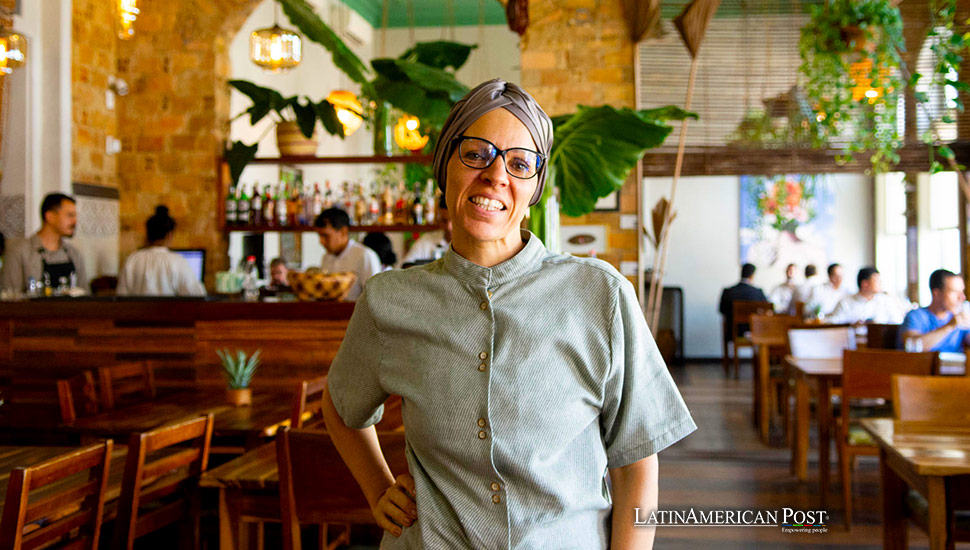Brazilian Chef’s Amazonian Culinary Revolution

Débora Shornik’s culinary journey from São Paulo to the Amazon has transformed local ingredients into gourmet experiences. At her restaurant, Caxiri in Manaus, she offers a unique gastronomic experience that bridges the gap between the jungle and the plate.
Brazilian chef Débora Shornik, whose career began in São Paulo and blossomed through various restaurant experiences, found endless inspiration in the Amazon. For the past eight years, she has shared this inspiration with her patrons at Caxiri, her restaurant in Manaus.
According to Shornik, her mission at Caxiri is to “bring people closer to the jungle” through a menu based on local ingredients that change seasonally in harmony with the region’s rhythms. Her dishes feature regional fish like pirarucú and tambaquí, which she combines in delicious fusions with other local ingredients such as uarini flour and tucupi, a broth made from manioc renowned for its rich umami flavor.
A Unique Amazonian Flavor
Shornik explains that “Amazonian cuisine seems more different than it is” because it has always been viewed through a lens of exoticism. However, she argues that “the unfamiliarity disappears with the first bite.” Originally from São Paulo, Shornik never intended to “open an Amazonian restaurant.” Instead, a job opportunity at a hotel in Novo Airão introduced her to the ingredients, their uses, and their stories, thanks to the women who cooked with her.
Since then, Shornik has traveled a long path in Manaus and São Paulo, where she returned to cook “using the feelings of the Amazon” rather than the ingredients. She recalls, “The current logistics did not exist back then.” Her goal is to cook from the “perspective and feeling of those who live and eat in the Amazon” rather than simply offering “typical food.” In 2016, Shornik opened Caxiri, named after a traditional fermented drink consumed by various indigenous peoples of the region.
Shornik remembers that when she opened the restaurant, she thought she “had to come with ready-made recipes and substitute ingredients.” Over time, she realized that “none of what I used in São Paulo was necessary; the recipes and cuisine would be different.”
The Essence of Local Ingredients
“I think we should try to keep things that belong to specific places so that everyone can participate in their history and work and live from their own culture, rather than wanting to have all the ingredients everywhere,” Shornik asserts.
Similarly, Shornik questions market efforts to “value” Amazonian products: “Value for whom? For those who can afford it or those who live here and need to eat?” The chef believes the global popularity of products like açaí has led them to “stop being local food for sale. It’s not surplus production; families dedicate themselves exclusively to production for sale.”
Shornik argues that “the logic of commerce has to change” and warns of the risk of this movement becoming “a new colonization.” She stresses that “it’s an issue that needs much more discussion” and emphasizes that “the Amazon must be consulted” in these processes.
Bridging Tradition and Modernity
Shornik’s philosophy extends beyond cooking. Her approach at Caxiri seeks to respect and preserve the Amazon’s cultural and environmental heritage. She creates a bridge between tradition and modernity by using local ingredients and traditional methods. This is crucial in a region where the balance between development and preservation is delicate and often contentious.
In Latin America, the significance of food transcends mere sustenance; it is a cultural cornerstone that carries stories, traditions, and a sense of identity. In the Amazon, this is particularly pronounced. The ingredients used by Shornik, such as pirarucú, tambaquí, uarini flour, and tucupi, are not just components of her dishes but are deeply rooted in the daily lives and traditions of the local communities.
Shornik’s journey from São Paulo to the Amazon is a testament to the transformative power of food. Her experience in the Amazon has reshaped her understanding of cuisine, making her a pivotal figure in the culinary world who advocates for a more sustainable and culturally respectful approach to food. This perspective is vital in a globalized world where local traditions and ingredients often face the risk of commodification and loss of authenticity.
Shornik’s work highlights the need for a shift in how we view and interact with food from the Amazon. Her commitment to using local ingredients and supporting local communities is a model for sustainable gastronomy. This approach not only preserves the region’s culinary traditions but also promotes economic and environmental sustainability.
Furthermore, Shornik’s emphasis on the stories behind the ingredients adds a layer of depth to her cuisine. Each dish at Caxiri is a narrative that connects the diner to the land and the people of the Amazon. This storytelling aspect is crucial in preserving the region’s cultural heritage and educating diners about the importance of sustainability and respect for local traditions.
In a broader Latin American context, Shornik’s approach is an example of how chefs can play a role in preserving and promoting cultural and culinary heritage. Latin America is a region rich in diverse culinary traditions, and chefs like Shornik are at the forefront of a movement that values and protects these traditions while adapting them to contemporary tastes and environmental realities.
Débora Shornik’s work at Caxiri is more than just cooking; it is a form of cultural preservation and advocacy. By bringing the flavors and stories of the Amazon to her diners, she fosters a deeper appreciation for the region’s culinary heritage and the need for sustainable practices. Her journey from São Paulo to the Amazon is a powerful narrative of discovery, adaptation, and commitment to preserving the rich cultural tapestry of the Amazon through food.
Also read: Brazilian Left-Wing Tax Policies Are Inadequate Solutions for Economic Growth
Through her innovative use of local ingredients and her dedication to cultural preservation, Shornik has significantly impacted the culinary landscape of the Amazon. Her story is a powerful reminder of respecting and preserving local traditions in a globalized world.





